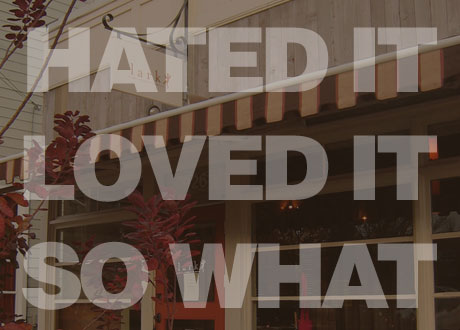To Review or Not Review?
Posted by Mark Busse on Sunday, January 18th, 2009Tags for this Article: opinion, restaurant, review

When should one write a restaurant review and how?
This is a post with two minds. On one hand, I enjoy seeking out and trying new restaurants and often use online searches to find reviews of new restaurants. And, being rather opinionated and verbose, I enjoy occasionally writing about my experiences in a review, even if I didn’t enjoy it much. But there are so many well-written restaurant reviews online, many of which I disagree with and often find myself adopting an opinion and avoiding a place based on the writing of others. That seems sort of dumb.
So what to do? There’s so much good food to experience and it can’t hurt to add some fodder to the mix, right? Well, that depends I guess. Sharing news of a new spot with a unique offering is terrific, though gushing over every little detail about a restaurant, its story, chef, service, interior or presentation seems pointless if the food sucks. Of course reviews that are overly critical seems unfair and not particularly helpful for the reader, who may in fact disagree with the assessment. See what I mean about two minds?
Writing a positive review is easy frankly. If the location is good, interior design is conducive to creating a comfortable dining environment, food is fresh and prepared in a unique fashion and the service and prices are pleasing, it’s easy to rave about the experience. Writing a balanced negative review can be the real challenge. Perhaps the food really failed to meet your expectations or your customer service experience was sub par. I often find myself as interested in the room and the way I feel in the space as I do about the food and presentation. And of course there’s the issue of perceived value—an expensive meal that let you down really stings.
This site doesn’t have an excess of restaurant reviews. In fact, there are only a rare few restaurant reviews here to date—intentionally so. There are already so many food blogs with numerous reviews in existence. Can we add much? Perhaps. Perhaps not. One of our contributors, Karen Hamilton, has written some great reviews on her site Tiny Bites, many of which are featured on Urban Spoon. Yet another of our writers, Jer Thorp, resists the urge to write about restaurants as a general rule, explaining that he feels there are already far too many ill-informed opinions littering blogs based on one experience at a restaurant, often in early days after its opening and feels this is unfair.
Restaurant reviews should be written by experts. Another issue Jer feels is key to a good review is an informed opinion. Useful food reviews are written by food experts, often former chefs or trained professionals with experience in the restaurant business. Essentially opinions that matter. Just because we adore good food, perhaps even having some training ourselves, doesn’t mean we have the right to blast a restaurant because they served your soup cold. Uh, it’s called gazpacho genius.
Bad reviews can sink a restaurant before they find their wind. Lastly, in these days of online searches to guide our every decision, consider the impact of harshly criticizing a restaurant based on one bad experience? What if your blog or post becomes the number one hit online, which is actually fairly likely if it’s a new restaurant and you were one of the first to write about it. Your personal need to sound pithy and clever, describing how terrible a restaurant was may very well impact the decision by many to avoid the establishment, hurting them as they work out the bugs in their new business.
To review or not review? Were I asked to give some advice to someone excited to share their culinary experiences online, I’d say this: Do it! Share with us all you’re discovery so we might be inspired to experience it for ourselves, or not. But be fair. Remember that your personal preferences may vary greatly from many others, so be as objective as possible and stick to the facts. Take notes while the experience is fresh in your mind and avoid sweeping opinions, reserving judgment until you’ve been there at least twice. Remember that your words may have a lasting impact on the business you many not realize. And be prepared to try it again and change your mind. If they improve the issues you’ve been ranting about, perhaps it’s time to revise or amend your post, or even take it down altogether. Perhaps a restaurant you once loved has fallen from grace? Write about that too.
Question for readers: Do you value restaurant reviews? Do you write reviews yourself and have some tips for us to consider?


Posted on January 18th, 2009
Boris Mann says:
“What if your blog or post becomes the number one hit online, which is actually fairly likely if it’s a new restaurant and you were one of the first to write about it.”
Smart restauranteurs — in fact, businesspeople of all stripes — can and should be monitoring the Internet. They can reach out to people like this.
Oh, and of course, they should be making good websites that rank highly in Google. Basically, if your restaurant website isn’t the number one hit for your restaurant name …. then you’re doing it wrong. Take the website down and fire your web people until you can decide to do it right. Seriously.
While you’re at it, optimize for “your restaurant name +reviews”.
“Remember that your words may have a lasting impact on the business you many not realize”
Frack that! If you care enough to write a review (and really, we should only write if we CARE about the reviewed item), then reach out to the management of the restaurant and go over your concerns and disappointments.
“or even take it down altogether”
I think you’re still focusing on restaurants being terrible at SEOing and not spending money on it. It’s a new world — *all* businesses need to adapt.
Perhaps, like Glowbal and some other restaurants recently, reach out to some bloggerati and invite them in to taste and review.
Personally, I’m still waiting for a magical digital future when I can get a listing of all the lunch/dinner specials in a 3km radius.
Posted on January 19th, 2009
Ben Garfinkel says:
Just as there may be unskilled food reviewers out there, I believe there are as many or more unskilled at reading reviews.
Reviews, like anything else out there, need to be weighed carefully by the reader. If you are the sort of person swayed by one review, get into the habit of doing a survey of many reviews and go with your sense of the aggregate voice. That is, if you want to read reviews.
Certainly there are good and bad reviews of just about anything out there. Credible and not so credible sources. Hell, I believe a good deal of the reviews on Amazon.com are manufactured, fake or just plain biased. Do I avoid them? No, because after a half hour of reading I feel I have a better overall sense of the product or book I’m researching.
And while true that some people are simply unqualified to pass judgment on the food they eat and should not be writing about it in a public forum, there are indeed others, with and without formal food training, that you can rely on. My point here is that there are trusted sources/people whose opinion I will take at face value.
It’s just as easy to be critical of a place as full of praise for it, but as you’ve said, it’s the balanced review that’s the biggest challenge. Recently I dined at Campagnolo and despite the buzz and several friends who’d raved about it, I was not entirely impressed. There were some amazing and inventive items and some flops. I’ve held off on reviewing it since they might indeed need some time to sort a few things out, or I got an off night. Either way, I’m willing and will give them another shot.
I also think there’s a difference between a formal review and a casual opinion. The former requiring more detail, skill and expertise, while the latter can be as simple as, “I ate at this great little place today…”. If want to share my culinary finds with others I may not even bother with a review per se and just tell them to go there. Or not.
I agree with Boris as well. As a restaurateur you can no longer avoid the online world. In the face of semi- and mostly non-professionals with access to blogs and other online media you’d better be armed with a good online strategy. This includes reading and commenting proactively on blogs. Sure, every restaurant has a bad night or disappoints a customer now and again, and the days of staff knowing who is simply enjoying (or trying to enjoy) a meal and who is about to editorialize it are all but over (unless they pull out their camera and start shooting photos of the food before they eat), but I say best defence when it comes down to it is to focus on providing a superlative and consistent dining experience. At least that way the reviews will be relatively consistent too.
Oh, and another tip for those inclined to write reviews is to make notes right away, but resist the urge to post reviews, especially negative ones, immediately. Chill out and think about it rather than writing a vindictive lashing.
Posted on January 28th, 2009
Kevin Broome says:
Writing a good restaurant review is not about whether or not you are qualified to talk about food. It is about good writing. Attempting to describe how something tastes is a very difficult task akin to trying to describe how an album sounds. Certainly, a background in cuisine and proper dining etiquette will help you in judging how well the restaurant performed as a whole, but for that truly sensual account of how a particular dish seduced your palette, I would choose my review to be written by a poet over a chef every time.
Posted on January 29th, 2009
Jer says:
My opinion on writing reviews is somewhat more complicated than I was able to communicate to Mark when he talked to me prior to this article. It’s not really that I expect reviewers to be chefs, or experts – I’ll side with Kevin in that I’d rather read a well-written review than an clumsy but authoritative one. Nor do I really think that a restaurant will sink or swim due to the postings on a food blog. Here I’ll agree with Boris that dealing with bad reviews and publicity management are part and parcel of doing business in this (or any) age.
Let’s try this: food blog restaurant reviews tend to remind me of radio call-in shows. While a small percentage of the posts are well-informed, considered, and informative, more of them are over-opinionated, and seem to struggle for cleverness at the cost of content. A lot of people just like to hear themselves talk (or write).
I’m not trying to disparage people who write reviews on this site or on any other. I personally feel that there are so many other avenues available to me in food writing that to wade into the murky and over-crowded waters of restaurant reviewing is a waste of my time.